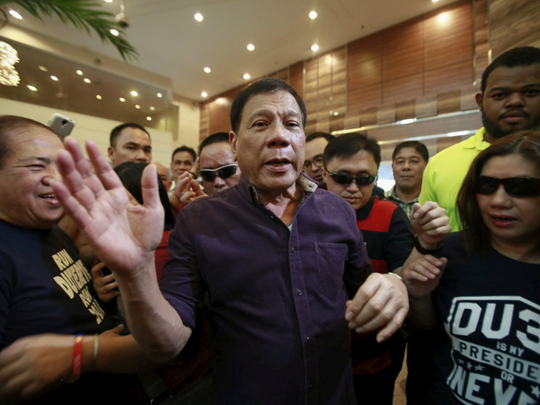
Predictably, most news outlets in the West were alarmed at the prospect of a leader at the helm of the Philippines who promises to reinstate the death penalty and offer Cabinet posts to Communist rebels. Their counterparts in Asia were more circumspect and generally urged the former mayor of Davao city to deliver on his pledge of a crime-and-corruption-free government.
“Rodrigo Duterte says he is no Donald Trump... Mr Duterte is nevertheless about to offer an example of what happens when a populist demagogue triumphs over a discredited political establishment. The results are unlikely to be good for either the Philippines or its close alliance with the United States,” said the Washington Post in an editorial comment.
“There is more than rhetoric to Mr Duterte’s menace. Human Rights Watch dubbed him the ‘death squad mayor’ for more than 1,000 extrajudicial executions of alleged criminals, including some street children, during his 20 years as mayor in Davao. Far from offering excuses, Mr Duterte has embraced that record and promised to repeat it on a national scale; he says he will murder suspects himself and then grant himself a presidential pardon,” the paper said.
The New York Times focused on Duterte’s indication to try a new approach towards China by emphasising economic ties. “During the campaign, he talked tough about China’s activities in the South China Sea, saying he would ride a jet ski to the contested Spratly Islands and plant the Philippine flag there. Yet, he also said he would seek Beijing’s help in building a rail line that would link Manila to the southern island of Mindanao... He even proclaimed he would ‘shut up’ about the South China Sea if China built the railway. Development rather than deterrence — that is going to be doctrine on the South China Sea,” said the newspaper.
In the Philippines itself, the Manila Times said the election results ushered in a period of both hope and uncertainty. “Fed up with empty promises, and suffering from one of the highest rates of poverty and unemployment in Asia, the Philippine electorate has voted into power a curious mixture of political outsiders,” the paper said in an editorial. “After having raised expectations to stratospheric levels, however, the incoming Duterte administration faces an uphill battle in satisfying an impatient, exhausted, and polarised citizenry.”
The Straits Times in Singapore, meanwhile, went back in time to trace the campaign rhetoric of Duterte and urged him to prove his alarmist critics wrong. “Now that the election is over, attention will focus on what happens to the Philippines on his watch. Mr Duterte cannot complain that he inherited a poisoned chalice. The economy he inherits from President Benigno Aquino is a strong one... The highly literate, English-speaking nation of some 100 million needs policies that promote not only growth, but employment as well.”




_resources1_16a31069e4e_small.jpg)







